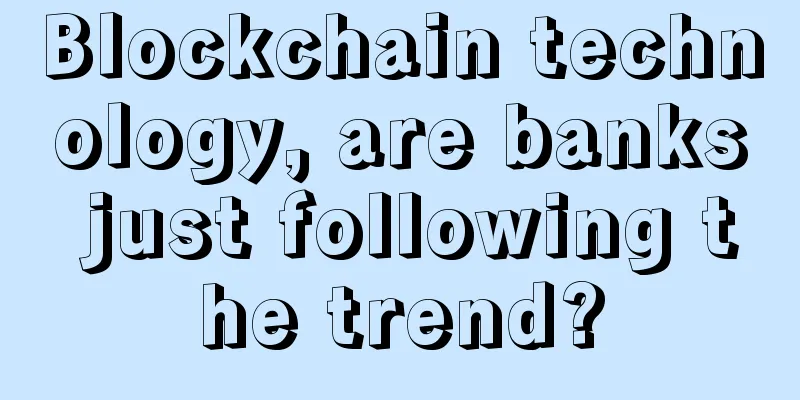Blockchain technology, are banks just following the trend?

|
In early 2016, Andrew Keys, co-founder of ConsenSys, predicted that the price of Bitcoin would rise due to the reduction in production and the attention of Chinese investors. Perhaps he did not expect that as of December 23, 2016, the highest price of Bitcoin had reached 6,458 yuan, a three-year high. Among many industries, banks have been the most active participants since the beginning. The reason for this enthusiasm may be partly due to the panic and worry of "possible subversion", so we must "know ourselves and know our enemies". On January 20, 2016, the People's Bank of China held a seminar on digital currency, with senior executives from 50 large banks participating. Although this conference was seen as my country's recognition of the value of blockchain and digital currency, boosting industry confidence, most banks at the time were still skeptical about this technology. In the following year, many countries, including the United Kingdom, Switzerland, Denmark, and India, announced that they were stepping up the development of national digital currencies. At the same time, banks in many countries and regions have established or joined various industry alliances in the hope of becoming participants in the formulation of future industry standards. According to the latest survey results released by Accenture, 90% of large banks in North America and Europe have participated in the research of blockchain payment applications. Given the core characteristics of blockchain technology, such as decentralization, trustlessness, collective maintenance, and immutability, this technology will be able to produce the most direct and effective applications in financial scenarios such as virtual currency, cross-border payment and settlement, bill and supply chain finance, securities issuance and trading, and customer credit investigation and anti-fraud. For example, Citigroup has developed three blockchains and tested and run a cryptocurrency called "Citicoin" on them. However, the bright prospects that blockchain technology brings to the banking industry may not be within reach, and the banking industry may need more patience. An executive of a financial technology solution provider told reporters that most of the projects his company is currently working on with banks are non-core business projects with weak supervision, and the banks themselves do not expect blockchain technology to generate many benefits at this stage. "At this stage, banks are more engaged in proof-of-concept projects in order to not fall behind in the exploration of new technologies." Most of the current blockchain startups are small startup teams. The scale and complexity of many bank projects are something these small teams have never seen or are not capable of handling. The high risk of startups will also make conservative banks worry about the risk that if the company goes bankrupt, the founder will "run away" and no one will hold him accountable. For banks, these are realistic issues that must be considered. On the other hand, regulatory uncertainty is a major factor that constrains banks’ exploration. Regulators are also working hard to learn and understand this emerging technology, and relevant regulatory standards have not yet been determined. Although it is difficult for these investments to reap returns in the short term, there is no doubt that 2017 will see the banking industry invest more in and experiment with blockchain technology in order to avoid falling behind in the competition. A recent IBM survey of 200 banks around the world showed that 15% of banks will launch products based on blockchain technology in 2017, and 65% of banks choose to launch them in the next three years. |
<<: Coinbase co-founder Fred Ehrsam: Virtual reality will be the killer app for blockchain
Recommend
Teach you to identify personality traits through physiognomy
Physiognomy is the science of measuring and judgi...
Is Bitcoin just a financial game?
Overnight, Bitcoin (BTC) continued to fluctuate b...
The characteristics of extremely intelligent people are distinct earlobes
Appearance reflects the heart. Based on a person&...
Is it true that a woman with a full forehead is a lucky charm for her husband?
From the perspective of physiognomy, the saying t...
What does a woman with a festive face look like? Does she have a blessed life?
Many people have average looks but are well-liked...
How to read the marriage line on the hand to see a happy marriage or an unhappy marriage
What does a comprehensive analysis of the marriag...
What facial features will cause a woman to contradict her parents-in-law?
In China, the relationship between mother-in-law ...
Blockchain predictions for 2017: Identity will become blockchain’s killer app
Identity could be the killer app that propels blo...
What is the drooping eye?
It is said that eyes are windows to the soul. In ...
What is the shape of a mouth that indicates good fortune? Come and see if you have it.
The mouth is one of the five senses. It is the ca...
These faces are most likely to get divorced in 2020.
2020 has arrived, and many people's marriages...
Is your nose a money-scattering nose?
In physiognomy, the nose is called the palace of ...
Russia is about to cut off Ukraine's arms and legs, and the crypto market is volatile
Overnight, Bitcoin went up and down rapidly. Afte...
What does it mean when the love line is broken? What does it mean when it is broken at different positions?
Is it true that every relationship of people with...
Interpreting people's destiny from face shape
Interpreting people's destiny from face shape...









